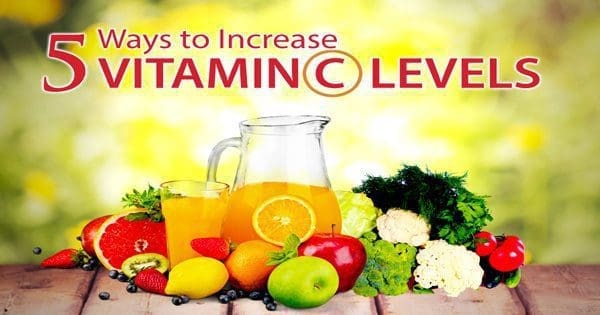According to Dr. Alex Jimenez, doctor of chiropractic, aside from regularly visiting a chiropractor to ensure the spine and it’s surrounding structures are functioning accordingly, a balanced nutrition consisting of vitamin C rich food sources is essential to promote the overall health of the cells. Vitamin C supplements can also be used to help increase the levels of vitamin C in the body.
Vitamin C is naturally produced in a majority of living organisms, with the exception of guinea pigs, primates and humans. Even dogs and cats can produce their own vitamin C from the food they’ve ingested which is then metabolized into glucose.
Most animals and plants are capable of synthesizing their own vitamin C through a biochemical pathway which is dependent on 4 different types of enzymes that function to convert glucose to vitamin C. In mammals, the glucose is extracted from stored sugar, known as glycogen. The transformation into vitamin C is produced in the liver.
Humans, on the other hand, need to consume vitamin C rich food sources to make up for what the body can’t produce on its own, otherwise, people may be at risk of developing severe health complications. In fact, glucose and vitamin C share a connection between the body’s immunity and overall cellular health. Consuming the proper levels of vitamin C is ultimately essential. The following 5 key points can help individuals effectively increase their vitamin C intake levels.
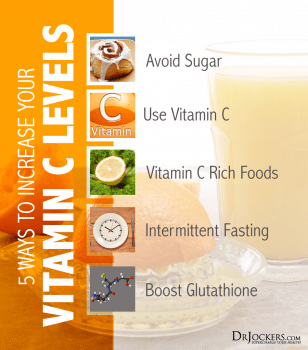
Table of Contents
Glutathione Recycles Vitamin C
Humans lack the L-gulonolactone oxidase enzyme which is fundamental for the last step of vitamin C synthesis. For humans, a sufficient amount of vitamin C is required in order to build healthy tissue collagen and promote strong immune functions.
In the case low levels of vitamin C are reached, the body will function by recycling the oxidized version of vitamin C. This redox cycling is carried out by the master antioxidant glutathione. The vitamin C redox cycle will continue as long as there’s enough glutathione present in the body.
The Nobel prize winning chemist Linus Pauling discovered that white blood cells need very high doses of vitamin C in order to function effectively. In the late 1960’s, he developed the understanding of using high doses of vitamin C to combat the common cold. This technique has worked effectively for many individuals; however, there is more to the story when it comes to vitamin C.
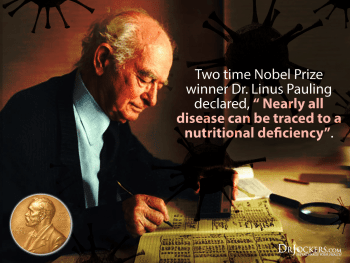
The GAA Theory
The glucose-ascorbate-antagonism, or GAA, theory was discovered in the 1970’s by Dr. John Ely, which proposed that elevated levels of glucose compete and effectively restrict vitamin C from entering cells because both of these share very similar chemical makeups. Glucose and vitamin C are dependant of the pancreatic hormone insulin and its signaling effects to enter into the cells.
The Glut-1 receptor activates in response to the production of insulin which is an important element to allow both glucose and vitamin C to enter the cell. However, because glucose is believed to have a greater affinity for the insulin receptor, the greater the content of sugar circulating the blood allows for less vitamin C to enter the cell.
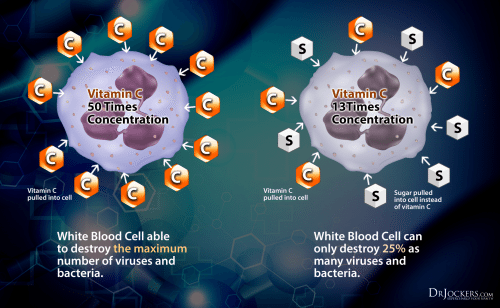
White Blood Cells and Insulin Pumps
From all the other cells found within the body, white blood cells contain the most number of insulin pumps, containing up to 20 times the amount of vitamin C as any other cell. As a result, they need 50 times more vitamin C to be present inside itself than in the blood plasma to handle the oxidative stress that occurs when they encounter a pathogenic substance.
When white blood cells encounter pathogenic bacteria and viruses, they must ingest or phagocytize these organisms in order to neutralize them. The phagocytic index measures how effective a particular white blood cell is at destroying viruses, bacteria & cancer cells. Elevated levels of sugar in the blood can impair this phagocytic index. As a matter of fact, a blood sugar of 120 reduces the phagocytic index by 75%.
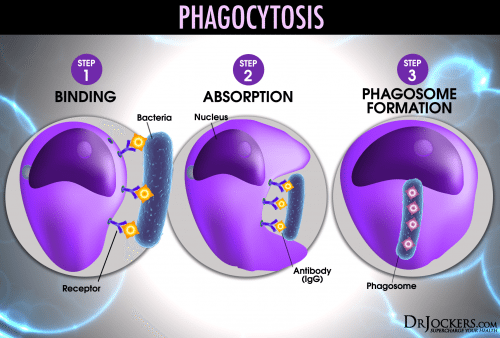
Vitamin C and the HMP Shunt
Glucose and vitamin C, otherwise known as ascorbic acid, are also fundamental to function on the hexose monophosphate, or HMP, shunt. The HMP is a biochemical pathway that produces NADPH, a necessary substance for white blood cells utilized to create superoxide and other reactive oxygen species which oxidize and destroy pathogens.
Vitamin C activates this important shunt while glucose inhibits it. This HMP shunt also produces ribose and deoxyribose which provide important raw materials for the formation of new white blood cell RNA/DNA.
Vitamin C is ultimately essential in this process because not only does it help produce NADPH but it also regulates the quantities so the white blood cell does not create excessive oxidative stress in its attempt to protect the body.
When the immune system is under attack, it often requires a rapid production of new immune cells. If the levels of sugar in the blood are high enough to where it turns off the HMP shunt, it will subsequently reduce the quantity of RNA/DNA and the amount of new immune cells formed.
Proper Vitamin C Level Food Sources:
The current adult RDA for vitamin C is 60 mg, however, it is recommended to intake at least 200 mg from food and ideally supplement with another 500mg -1 gram daily. In cases of chronic disease, higher dosages can be recommended by a healthcare professional.
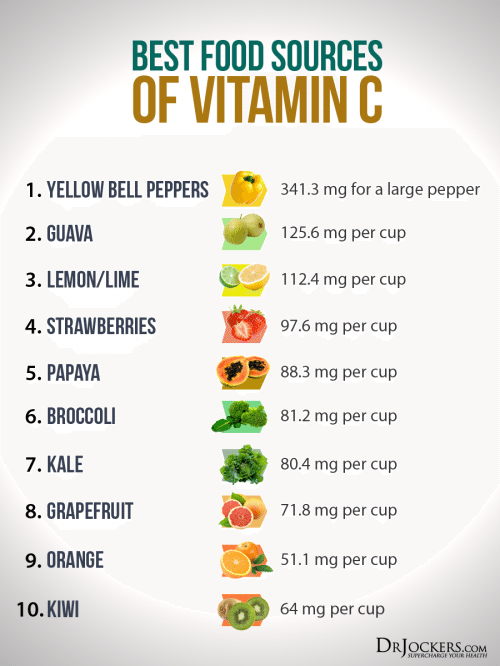
5 Ways to Increase Your Vitamin C Levels
1) Avoid Sugar: For the reasons mentioned above, avoid consuming sugar as much as possible by following a nutrition plan that contains lower amounts of carbohydrates.
2) Use Vitamin C: Load up on high quality vitamin C that also contains bioflavonoids with it to prevent illness – Approximately 1-2 grams per day is great for supplementation.
3) Vitamin C Rich Foods: Consume low sugar whole food forms of vitamin C such as bell peppers, broccoli, lemon, lime, & green leafy veggies as much as possible.
4) Intermittent Fasting: Combining intermittent fasting with vitamin C supplementation and lemon water can be of great benefit for improving blood sugar regulation and immunity.
5) Boost Glutathione: Natural strategies and key supplements such as super glutathione, can help boost glutathione levels in the body. Glutathione helps to recycle vitamin C and it may be more fundamental as a supplement than vitamin C, although vitamin C can be of great benefit.
5 Tips for Fighting Cold Weather Pain
.video-container{position: relative; padding-bottom: 63%; padding-top: 35px; height: 0; overflow: hidden;}.video-container iframe{position: absolute; top:0; left: 0; width: 100%; height: 100%; border: none; max-width:100%!important;}
Vitamin C is a fundamental substance for optimal body health and, because human’s can’t produce it on their own, consuming vitamin C rich food sources and/or adding supplements to a balanced diet can help keep this vitamin on a healthy level. Aside from being a well-known remedy to relieve the common cold and boost immunity, vitamin C is essential towards cell health.
For more information, please feel free to ask Dr. Jimenez or contact us at 915-850-0900 . 
By Dr. Alex Jimenez
Post Disclaimer
Professional Scope of Practice *
The information on this blog site is not intended to replace a one-on-one relationship with a qualified healthcare professional or licensed physician and is not medical advice. We encourage you to make healthcare decisions based on your research and partnership with a qualified healthcare professional.
Blog Information & Scope Discussions
Welcome to El Paso's Premier Wellness and Injury Care Clinic & Wellness Blog, where Dr. Alex Jimenez, DC, FNP-C, a board-certified Family Practice Nurse Practitioner (FNP-BC) and Chiropractor (DC), presents insights on how our team is dedicated to holistic healing and personalized care. Our practice aligns with evidence-based treatment protocols inspired by integrative medicine principles, similar to those found on this site and our family practice-based chiromed.com site, focusing on restoring health naturally for patients of all ages.
Our areas of chiropractic practice include Wellness & Nutrition, Chronic Pain, Personal Injury, Auto Accident Care, Work Injuries, Back Injury, Low Back Pain, Neck Pain, Migraine Headaches, Sports Injuries, Severe Sciatica, Scoliosis, Complex Herniated Discs, Fibromyalgia, Chronic Pain, Complex Injuries, Stress Management, Functional Medicine Treatments, and in-scope care protocols.
Our information scope is limited to chiropractic, musculoskeletal, physical medicine, wellness, contributing etiological viscerosomatic disturbances within clinical presentations, associated somato-visceral reflex clinical dynamics, subluxation complexes, sensitive health issues, and functional medicine articles, topics, and discussions.
We provide and present clinical collaboration with specialists from various disciplines. Each specialist is governed by their professional scope of practice and their jurisdiction of licensure. We use functional health & wellness protocols to treat and support care for the injuries or disorders of the musculoskeletal system.
Our videos, posts, topics, subjects, and insights cover clinical matters and issues that relate to and directly or indirectly support our clinical scope of practice.*
Our office has made a reasonable effort to provide supportive citations and has identified relevant research studies that support our posts. We provide copies of supporting research studies available to regulatory boards and the public upon request.
We understand that we cover matters that require an additional explanation of how they may assist in a particular care plan or treatment protocol; therefore, to discuss the subject matter above further, please feel free to ask Dr. Alex Jimenez, DC, APRN, FNP-BC, or contact us at 915-850-0900.
We are here to help you and your family.
Blessings
Dr. Alex Jimenez DC, MSACP, APRN, FNP-BC*, CCST, IFMCP, CFMP, ATN
email: coach@elpasofunctionalmedicine.com
Licensed as a Doctor of Chiropractic (DC) in Texas & New Mexico*
Texas DC License # TX5807
New Mexico DC License # NM-DC2182
Licensed as a Registered Nurse (RN*) in Texas & Multistate
Texas RN License # 1191402
ANCC FNP-BC: Board Certified Nurse Practitioner*
Compact Status: Multi-State License: Authorized to Practice in 40 States*
Graduate with Honors: ICHS: MSN-FNP (Family Nurse Practitioner Program)
Degree Granted. Master's in Family Practice MSN Diploma (Cum Laude)
Dr. Alex Jimenez, DC, APRN, FNP-BC*, CFMP, IFMCP, ATN, CCST
My Digital Business Card


